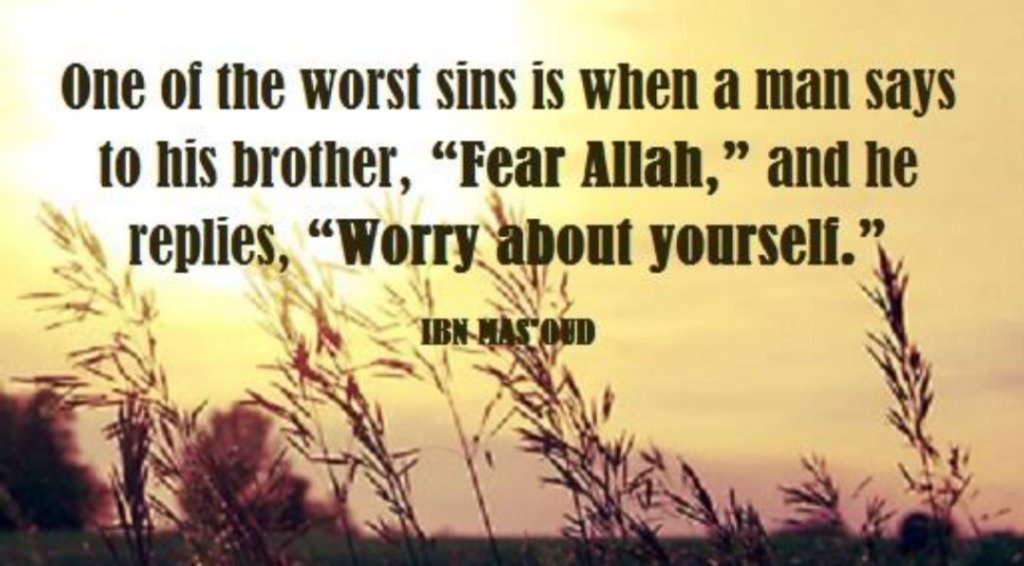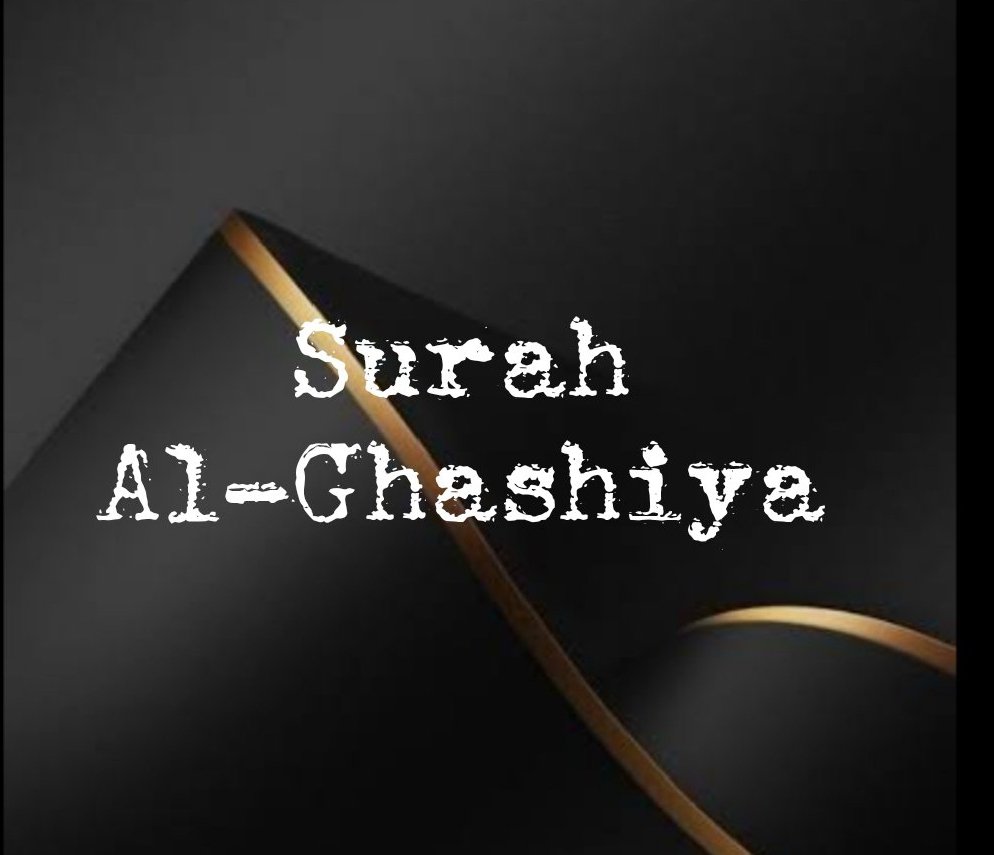
Surah Al-Ghashiya is a Meccan Surah with twenty-six verses. Ghashiya means The Overwhelming Event. The Surah takes its name from the word al-ghashiyah in the first verse.
The whole subject matter of the Surah indicates that this too is one of the earliest Surahs to be revealed but this was the period when the Prophet pbuh had started preaching his message publicly, and the people of Makkah were hearing it and ignoring it carelessly and thoughtlessly.
The first subject is the ‘Resurrection’ and the contrast between the destinies of the Good and the Evil in the ‘Hereafter’. Its purpose is to arouse the people from their heedlessness, the polytheists of Makkah have been plainly asked:”Do you have any knowledge of the time when an overwhelming calamity will descend?” When people will be divided into two groups, dwellers of HellFire and Paradise.
The second subject is ‘Monotheism’ with reference to the creation of the sky, the earth, and the mountains. Man should consider these wonderful matters as admonishments.
The third subject is ‘Prophecy’ and some of the duties that the holy Prophet pbuh was required to perform. After making the truth plain, the address turns from the disbelievers to the Prophet pbuh and he is told: “If these people do not acknowledge the truth, they may not; you have not been empowered to act with authority over them, so that you should force them into believing: your only task is to exhort, so exhort them. Ultimately they have to return to Us; then We shall call them to full account and shall inflict a heavy punishment on those who do not believe.”
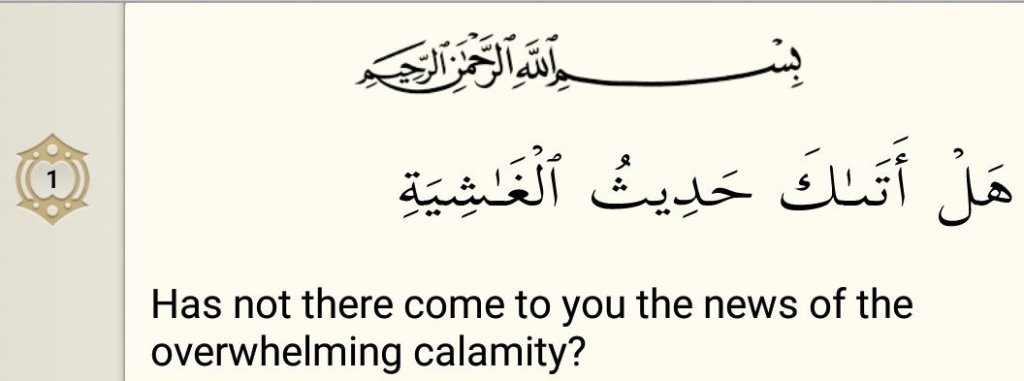
“The over-shadowing calamity”: the Resurrection which will overshadow the whole world. One should know that here the Hereafter as a whole is being depicted, which comprehends all the stages from the upsetting of the present system to the resurrection of all human beings and the dispensation of rewards and punishments from the Divine Court.
In the first verse of this Surah we are introduced to another name for the Hereafter; Ghashiyah which means to cover. Because the terrible events of Hereafter will suddenly cover everything.
The verse apparently addresses the Prophet pbuh and it is he who is being questioned in order to show the importance of the Day. This verse appears in the format of a question, that appears elsewhere in the Quran also. Allah is angry at those who give preference to this worldly life and reject to accept the truth even after the message has came to them. Even after they are encouraged to reflect upon their legacy that they claim to follow, the legacy of Ibrahim a.s as the Quraish claimed and Musa a.s as the jews claimed, now in threatening words Allah asks whether it is not enough that news of the covering event has come to them. By turning to His most righteous slave, Prophet pbuh, Allah is warning the disbelievers through speaking to His Messenger about the horror of that Day and that even if they don’t want to benefit from the warning, at least the one who wants to know has been informed.
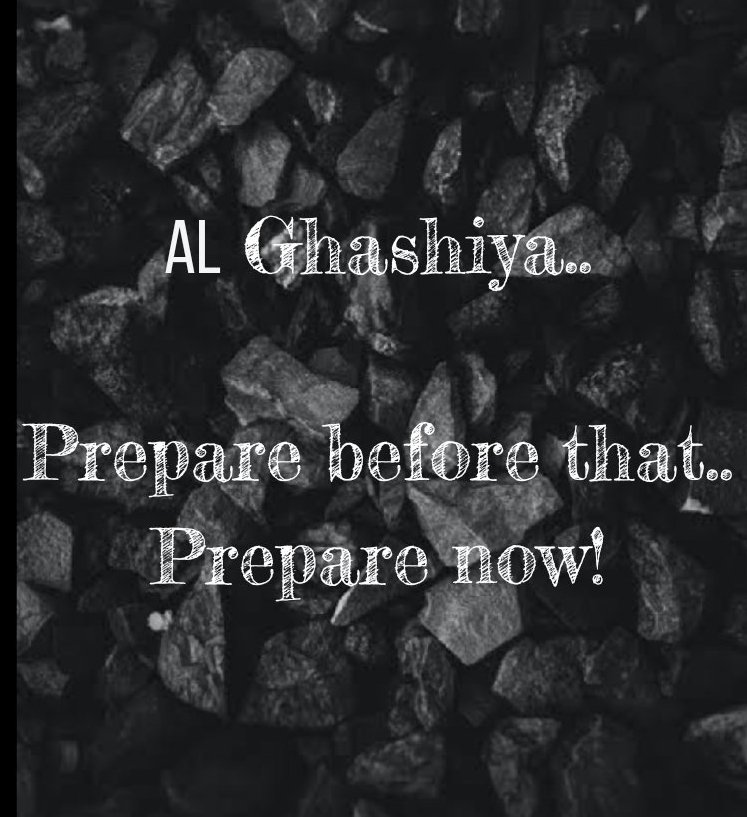

Now Allah points out the looser party at the Day of Judgement. Some faces : some persons, so said for the face is the most conspicuous part of the human body by which man’s personality is judged and which reflects the good or bad states through which man passes. Such people are full of shame and fear, because of the horrible chastisement of the Day and their lagging behind of deeds. Since it is man’s face which mostly reflects spiritual moods, so, their faces will clearly show their complete disgrace and horror.
The faces that day will be overwhelmed to the extent that there will be a numbness and exhaustion on them. Allah mentions this idea of overwhelming fear that overcomes limbs for different parts of the body on the Day of Judgement.
The Eyes:
‘With their eyes lowered in fear and humility (khashi’ah), humiliation covering them (all over)! That is the Day which they were promised!’
(Ma’arij 44)
The Tongue:
‘…And (on that Day) all voices will be fearful for the Most Beneficent (Allah) and nothing shall you hear but the low voice of their footsteps.’
(Taha 108)
The Faces:
‘Some faces on that Day are in extreme fear (humbled)’
(Ghashiyah:2)
The Believers however have fear of Allah only in their hearts:
Has the time not come for those who have believed that their hearts should become submissive at the remembrance of Allah and what has come down of the truth?
(Hadeed:16)
The heart is not mentioned for the disbeliever, as Allah does not grant them that honour. Fear on any part of the body is a sign of humiliation for the disbeliever. The believers however on that Day will have khushoo of Allah in their hearts and that is a sign of humility to Allah but not of humiliation.


You made yourself too tired but was it worth for Akhirah?
Who will be those downcasted faces that Allah previously mentioned? These are the Labouring (hard in the worldly life by worshipping others besides Allah), Exhausted (in the Hereafter with humility and disgrace)
Such people gain no profit, in their lives; only weariness, from their tiring efforts and endeavours. They have neither approvable good deeds nor can they take anything of their wealth with them, nor do they leave fame among people or a good child after them. They are tired from their striving, but in fact they own nothing! Means when they make up to Akhirah, their bag of salvation is empty.
Aamila referred to those people who exerted and exhausted themselves in the dunia for things other than Islam and did not fulfil the actions that Allah demanded of them.
Hazrat Umar ibn al Khattab r.a once came by a monk who had dedicated his life to Christian worship and began to cry. The companions when they saw him crying asked what had made him cry and Umar r.a answered ‘aamilatu nasiba’. This monk had exhausted himself in worship and given up his youth in a labour and worship that Allah will not accept and this made Umar feel sad to the extent that he wept.
Naasib in the context of this verse means to be wobbly, meaning you are so tired and overwhelmed that you cannot even stand straight. This person who has exhausted himself in work and is expecting relaxation in death will find on the Day of Judgement that Allah has something else in mind for him and will face the consequences of his ungratefulness to Allah.
We constantly need to check ourselves if we are not falling into this category especially the ages we live in, where worldy attractions and competition is at peak! As the real tiring energies should be for uplifting Allah’s Deen alone! Worth weighted in Akhirah!
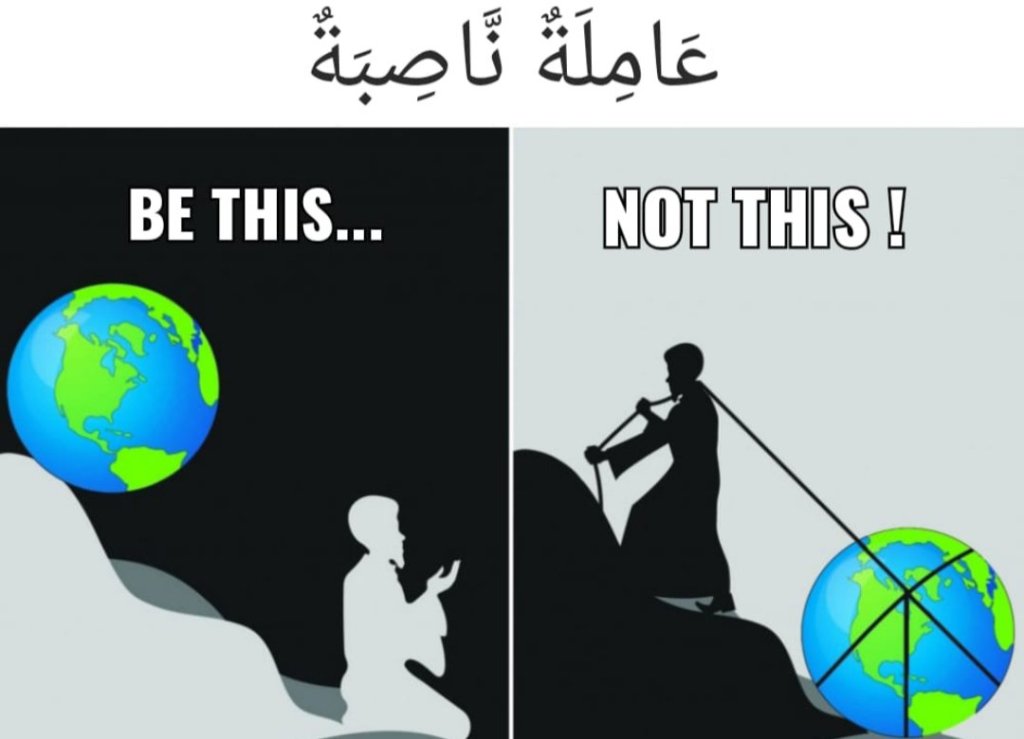
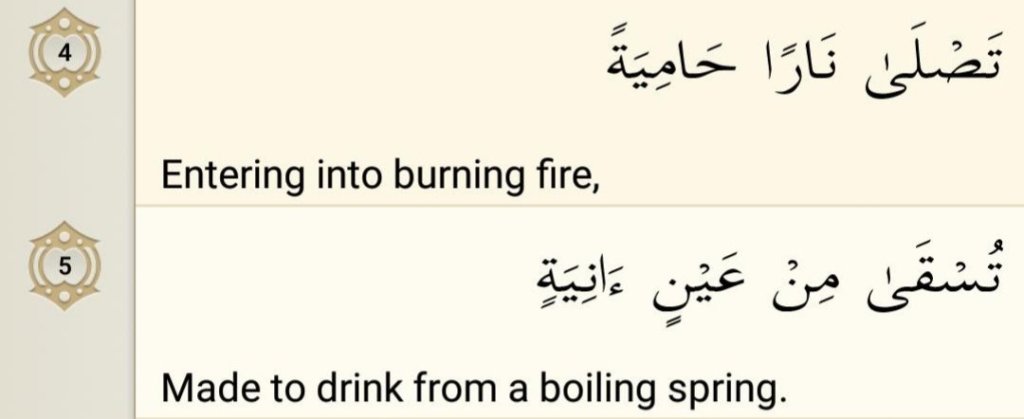
Now Allah describes the condition of punishment of dwellers of Hell. They will be completely overrun and surrounded by fire and this illustrates the worst kind of humiliation as they are not being thrown in but rather they themselves are throwing themselves in, with their faces subjected to fire first Naarun Hamiyaah means a scorching fire, preventing one from getting any rest or breaks from the pain one will be receiving.
After entering themselves into the fire, they desperately want relief from it and relief naturally comes from water. Thus, Allah describes that they will be given to drink from a boiling spring. They are so desperate for relief from the fire that they themselves would go to drink this water even though it is bubbling through heat.
The word aaniyah refers to water that is heated up and is about to reach boiling point and then starts to bubble. So, this spring gushes out intensely hot water onto the faces of these people and they are made to consume it. As if throwing yourself into the scorching fire was not enough, these people are now made to open their mouths and drink this boiling water like animals.
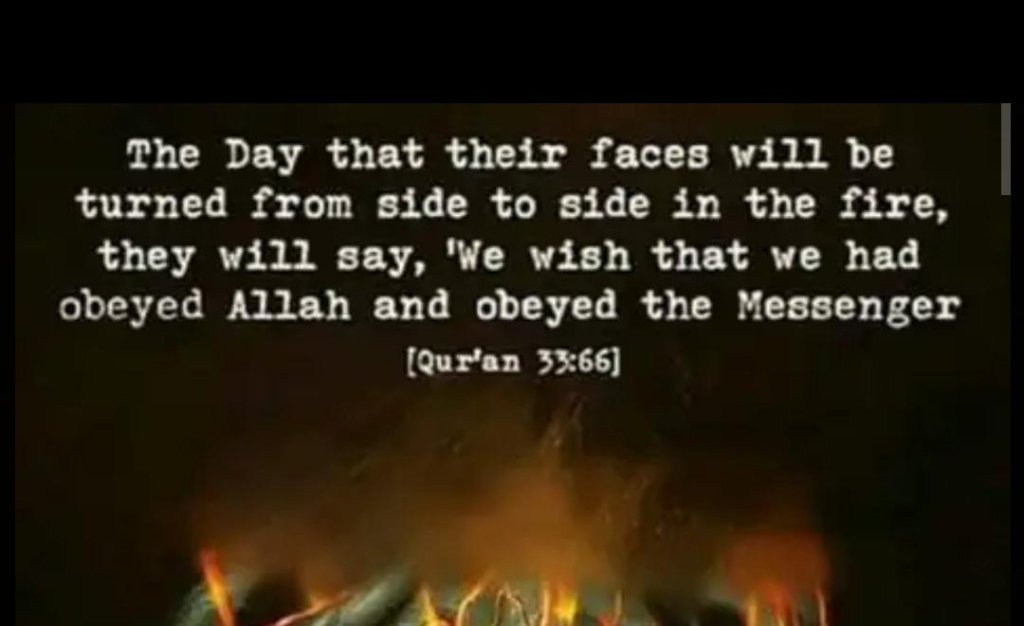
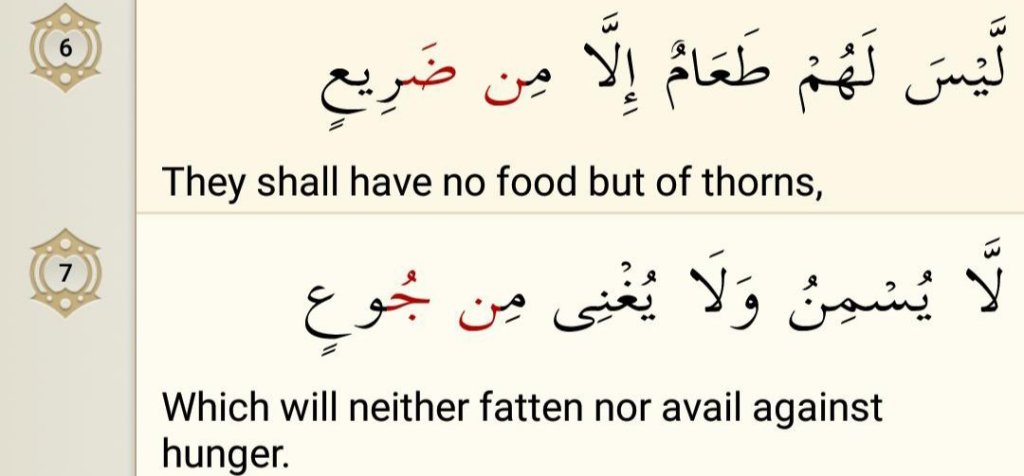
Now Allah tells us about the food of the dwellers of Hell. Daree is a sort of plant, having large thorns and grows close to the ground. The people of Quraish called it Shibriq when it is in its fresh state; and it is called daree when it is in its dry state. It is also said to be a poisonous plant which no beast will approach, because of its harmful quality. Only desert camels eat it as Allah has created them in such a way with thicker lips.
Allah says the dwellers of Hell will eat from daree. This indicates that their stomachs will force them to go around looking for food. Then when they find this plant they will have to go into it to eat it and as they do they will be poked with thorns, whereas animals in this life wouldn’t even approach such a plant!
There are three types of food that Allah mentions as being in the hellfire;
Zaqqoom, Ghisleen and Daree. Most scholars say that daree is the comprehensive term for all three types of food, therefore zaqqoom and ghisleen are types of daree.
The knowledge of the most horrible aspects of hellfire are a mercy for mankind as by thinking of the punishment to come it can make him correct his ways. So every time the kaafir now comes to eat food he’s going to think – ‘I’ve got nothing to eat except daree there. Some disbelievers, however, ignored this due to the hardness of their hearts. So they would sarcastically comment ‘Oh daree’? We’re going to get daree’ – that’s not so bad – our camels eat that and get fat and healthy with it. Allah responds to this sarcasm in the next verse.
“Which will neither nourish nor satisfy hunger!”
It is certain that such a thing is a food that will neither give nourishment to the body, nor in any way satisfy the burning pangs of hunger. Ordinarily, when you eat something that makes you feel sick or something you do not like the taste of you stop eating it but the disbelievers will continue to eat and eat this food adding to their humiliation.
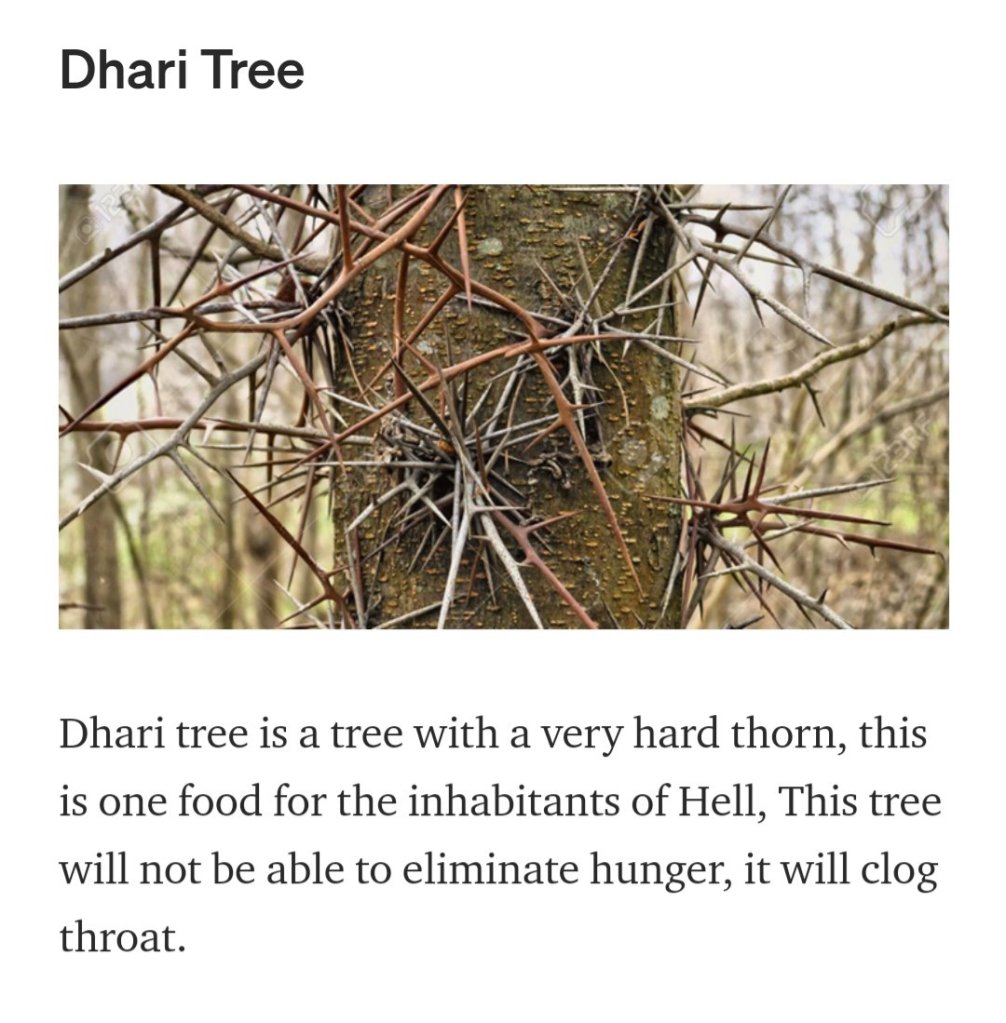
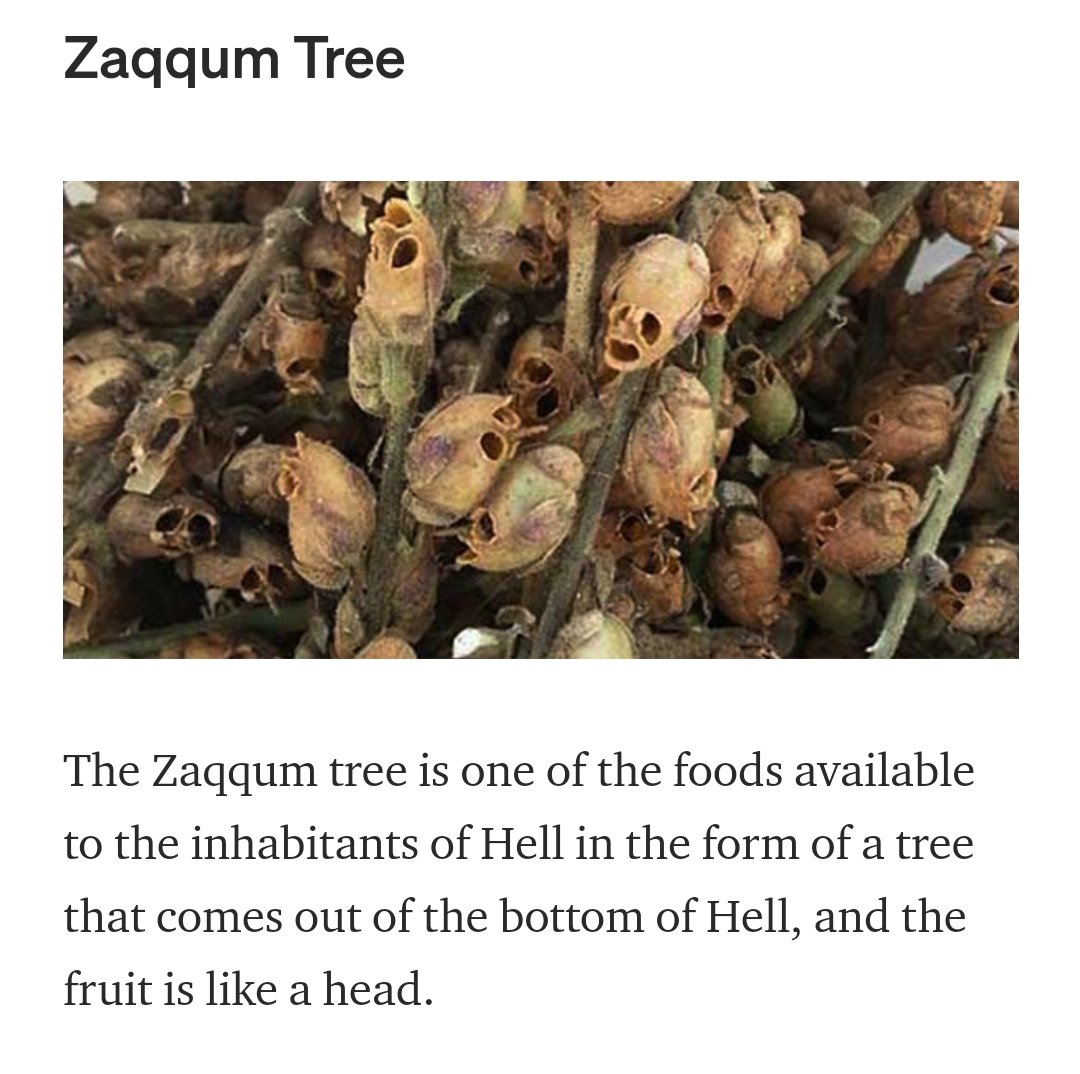
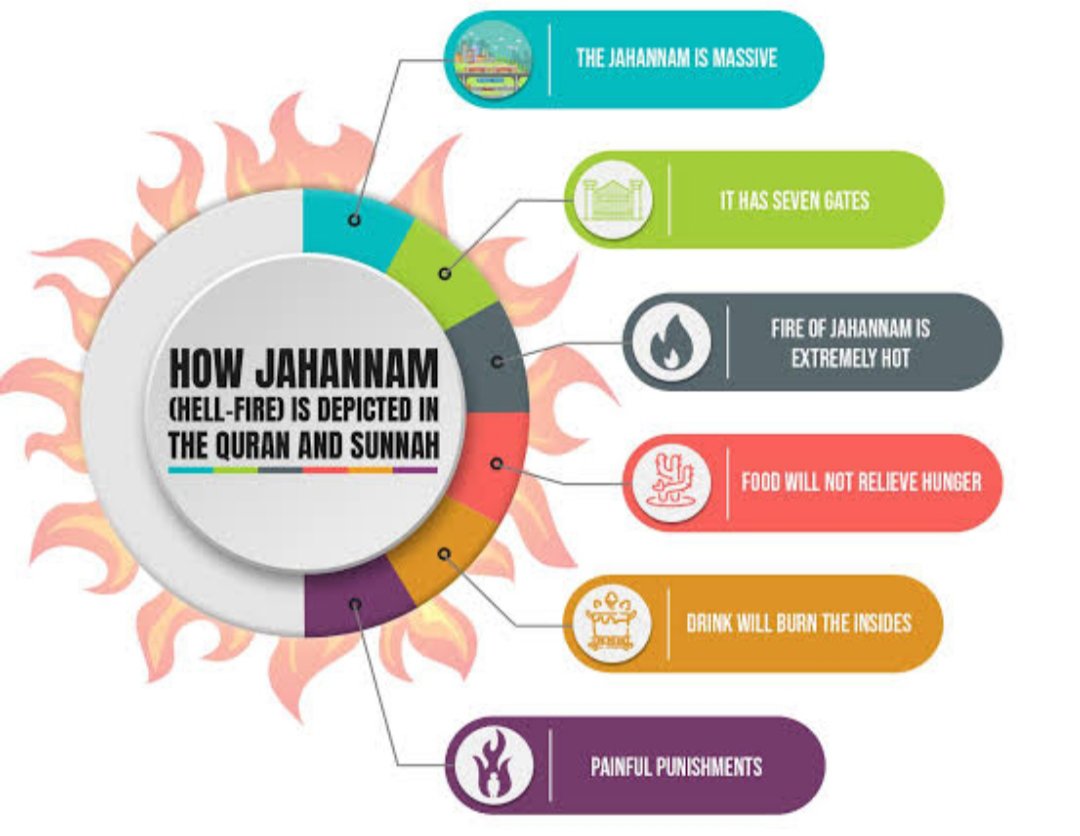
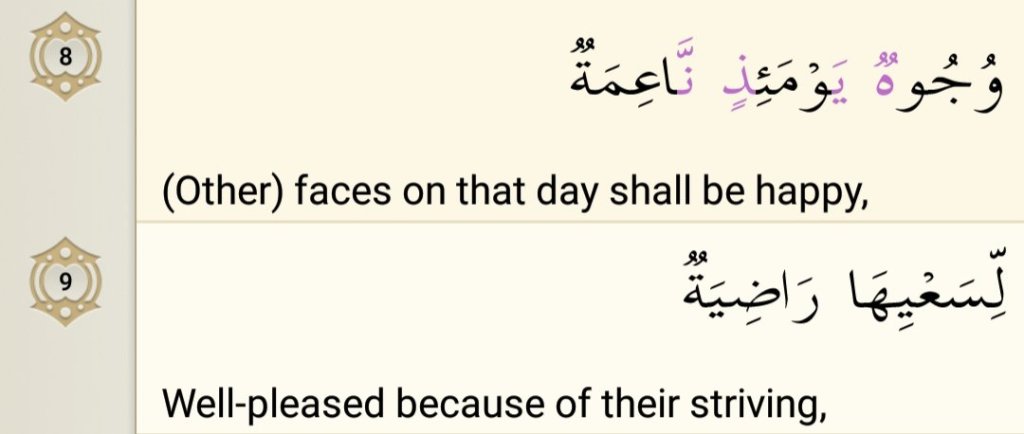
Now Allah turns to the other group, the righteous ones that their faces that Day will be in softness, ease and relaxation. There will be freshness on their faces and no sign of exhaustion and on that Day we understand that those who are going to enjoy this bliss are the people who put in a lot of hard work in this life, giving their lives for Allah’s pleasure, and endured hardship from the disbelievers. Na’imah literally refers to the face you have when you are given a gift and in response to a ni’ma one’s face becomes na’imah.
This is a clear contrast between two sets of people that are exhausting themselves in two opposite directions. Some people are tiring themselves by striving for this temporary world whilst others are striving and struggling in Allah’s cause. The difference is that on the Day of Judgement the disbelievers will wake up exhausted whilst the believers will wake up fresh, bright faced and in relaxation.
These people will be content with the urgent efforts they had made in this dunia. The energy and efforts they put into this task is captured by the word sa’ee and it is only through these efforts that led to their contentment in the benefits of the Hereafter. These are the efforts of prayer and purification, the remembrance of Allah, the efforts they made to protect themselves and their family from haram, the efforts they made to spread the Deen and to defend its integrity and the efforts they made to aid the weak and the oppressed. Due to all these efforts, amongst others, they will be pleased and satisfied (riddaa) on this Day.
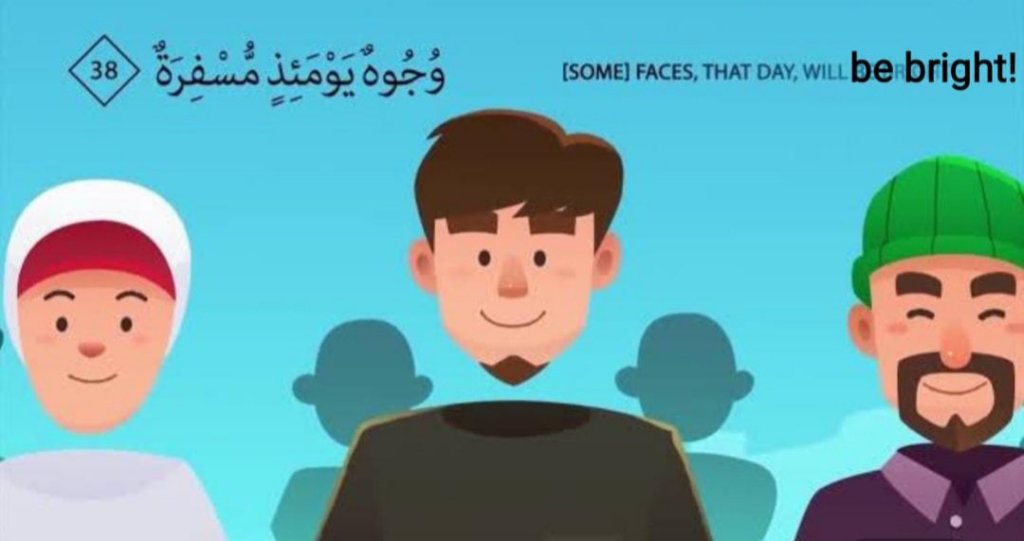
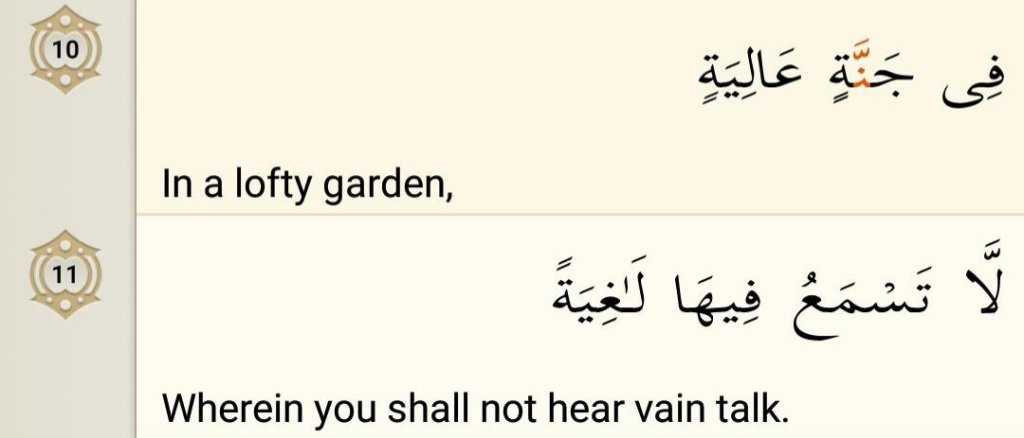
After describing torture upon torture upon the disbelievers Allah is now describing blessing upon blessing for the believers. On top of the contentment the believers already have Allah gives another blessing. Jannah is a lush garden and the believer will be gain this, having amazing fruits, flowers and vegetation.
The word laghiyah is worthless, obnoxious and useless speech and when things are said without thinking. Allah by addressing the Messenger pbuh has guaranteed that he will be the first to be in Jannah and that he will not hear any useless talk there and this is a gift from Allah. This is important to the Messenger as when he gives dawah people in response say obnoxious and insulting things. Thus, one of the pleasures of Jannah is that there will be no words that hurt your feelings and make you feel bad. In life, no matter who you are, you can always be hurt by someone’s speech. You can be having the best day of your life but a few words can very easily take away all the pleasures and joys of that day.
It’s not just for the Prophet pbuh but for all believers who will hear neither hypocrisy nor enmity or conflict. They will hear nothing of foolish or vain talk, no word of discord, enmity, hatred, no accusation, back-biting, nor idle talk.
And what a comfortable environment is such a place where none of these inappropriate words is heard. In fact, they are the origin of many troubles, and discomforts of our life in this world. They disturb the peace of our spirit and the regularity of societies; which lights the fire of sedition. Jannah is all peaceful!
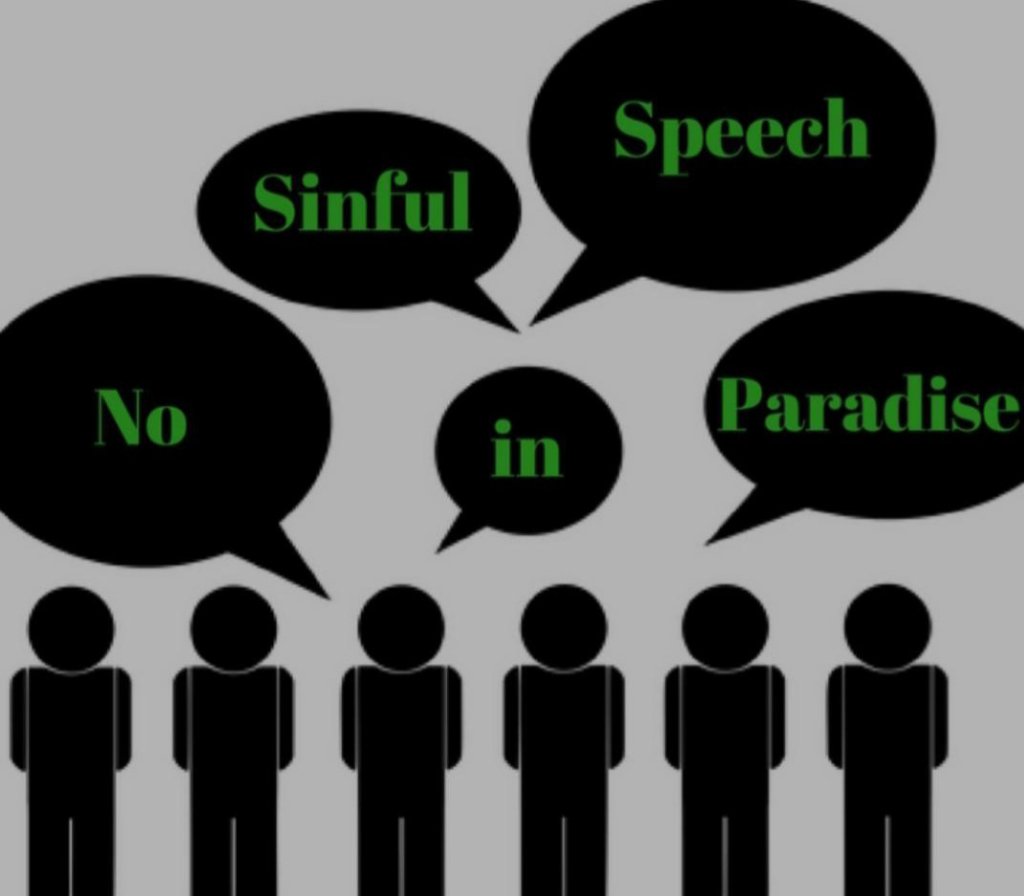
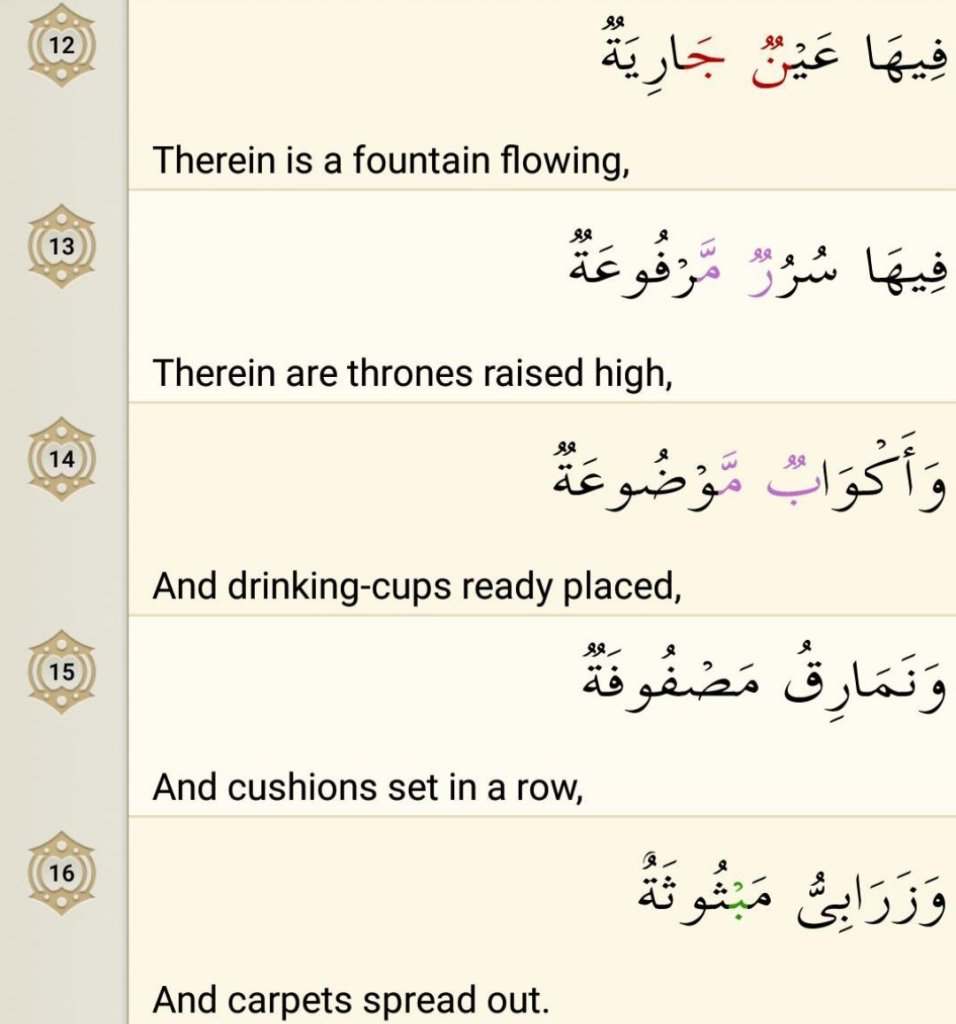
Now Allah gives further explanation of Jannah. It will have flowing springs. Jaariya means flowing and flowing water implies fresh clean water as when water stands it becomes stale and stagnant. Thus, the believers will reside in high gardens with flowing water which means that the believers will be atop waterfalls!
There are couches which have been custom made and elevated for the believers. Allah Himself is engaged in designing the homes of the believers and what is within them. Why is it appealing to have a seat in a high position? The seat is elevated so the believer can sit back and see everything he owns. In this world people spend their whole lives beautifying their homes but never get the time to enjoy it. This is not the case in Jannah where everything is done and taken care of for you.
Whenever they wish, the goblets are filled from the springs and are ready, in front of them, to drink and enjoy, to their hearts content. There are filled goblets already supplied so that they do not have to ask for them!
Namariq is a small pillow or cushion that you would place on your couch or bed to make it even more comfortable and masfoofah is row upon row of pillows. Thus, everywhere you look you will find comfort and relaxation.
Zaraabiyu are expensive rugs made of delicate fibres and in Jannah they will be mabthoothah, spread out as far as the eye can see. Exotic rugs throughout history have been a luxury product that fetches large prices from people looking to decorate their homes. Allah is giving people that which to this day in this dunia we chase after. People have an innate desire to have an attractive home, with a beautiful garden and flowing water, decorated with soft, comfortable furnishings and homes which serve the best possible food and drink, and this is what will be gifted in Jannah to the believers!
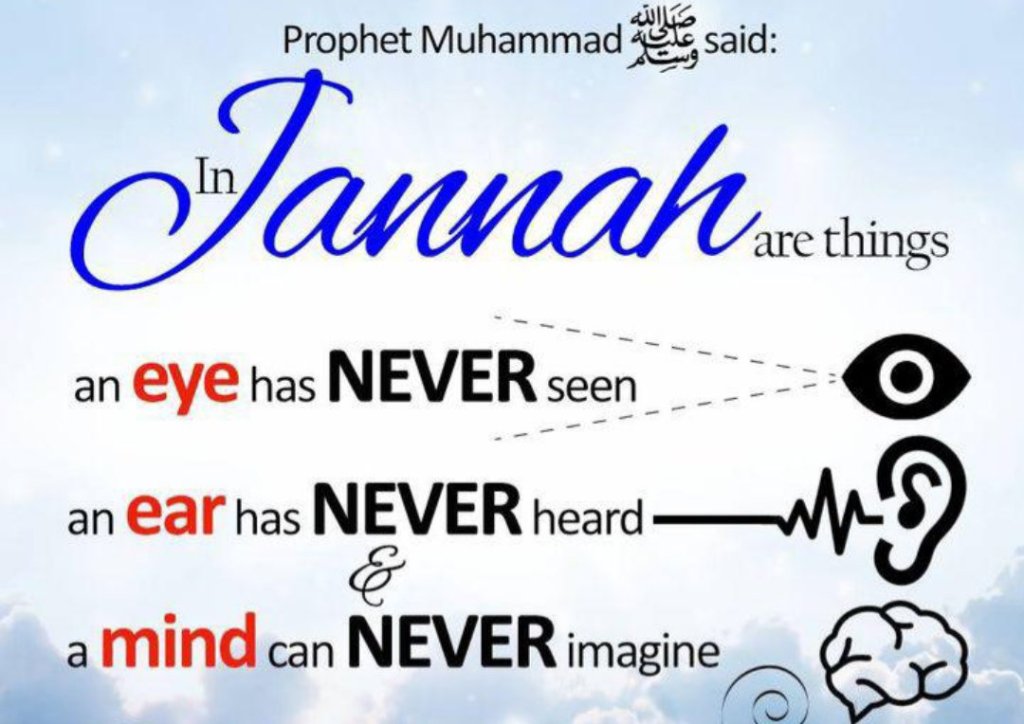
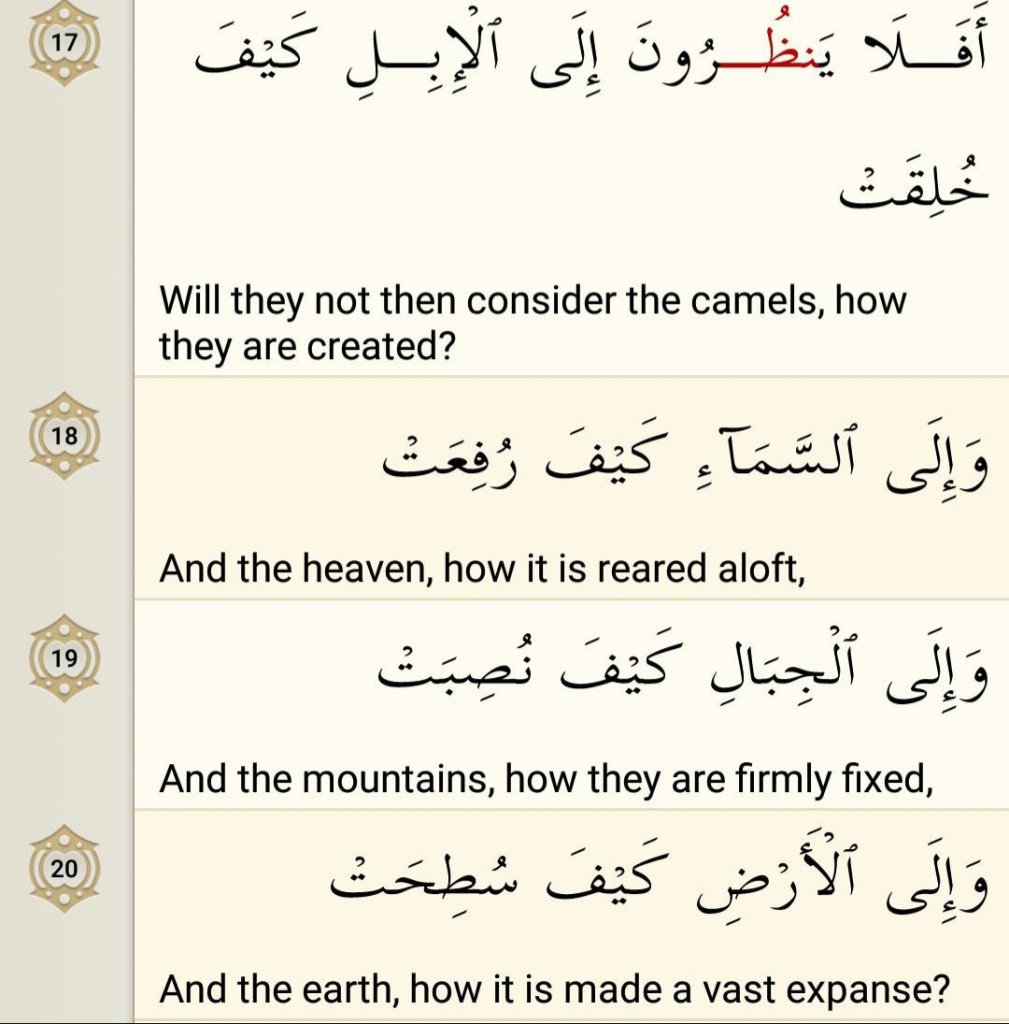
Now Allah turns our attention to ponder around. If those who deny the idea and possibility of the Hereafter, have they never looked around themselves and considered how the camels were created, how the heaven was raised high, how the mountains were firmly set and how the earth was spread out?
When all these things could be created, and exist before them in their finished form, why can the Resurrection not take place? Why cannot a new world come about, and why cannot Hell and Heaven be possible?
Only a foolish and thoughtless person would think that the coming into existing of only those things which he has found existing on opening his eyes in the world, is possible, because they already exist. As for the things, which he has not yet observed and experienced, he should thoughtlessly pass the judgment that their coming into being is impossible. If he has any common sense, he should think as to how he things which already exist, came into being? How did the camel possessing precisely the same characteristics as needed for the beast required by the desert dwellers of Arabia come into being? How did the sky whose atmosphere is filled with air to breathe in, whose clouds bring rain, whose sun provides light and warmth in the day, whose moon and stars shine at night, come into being? How did the earth spread out on which man lives and passes his life, whose products fulfill all his needs and requirements on whose springs and wells his life depends? How did the mountains rise up from the surface of the earth, which stand fixed with earth and stones of different colors and a variety of minerals in them?
Has all this happened without the artistic skill of an All-Powerful, AI-Wise Designer No thinking and intelligent mind can answer this question in the negative. Unless it is stubborn and obstinate, it will have to acknowledge that each one of these things was impossible, had an Omnipotent; Wise Being not made it possible. And when an All-Powerful, Wise Being created these things, there is no reason why the Hereafter should be regarded as remote from reason and impossible.
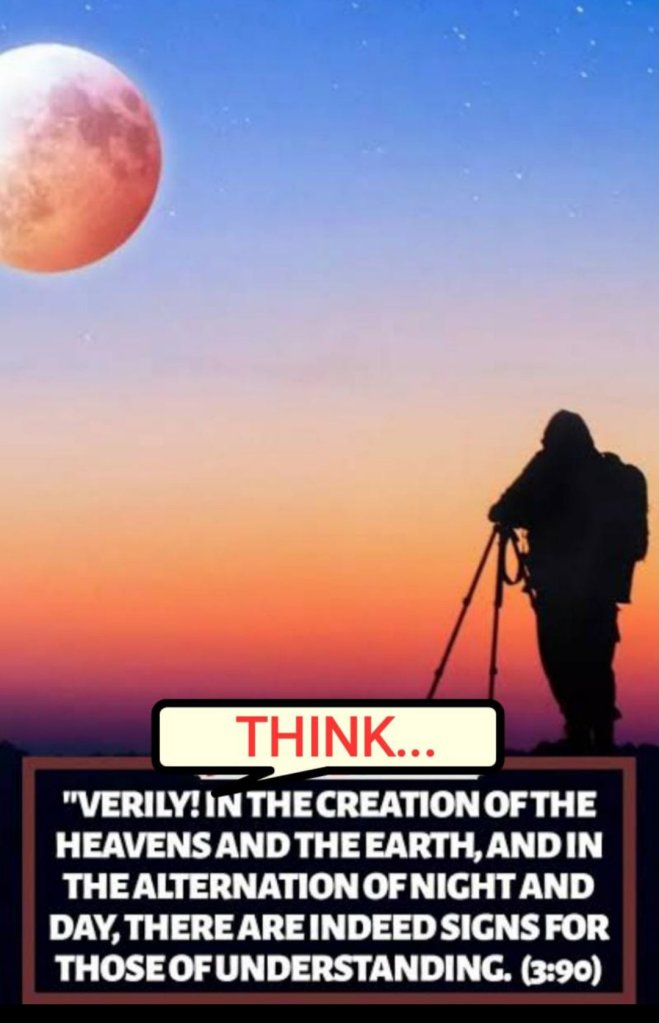
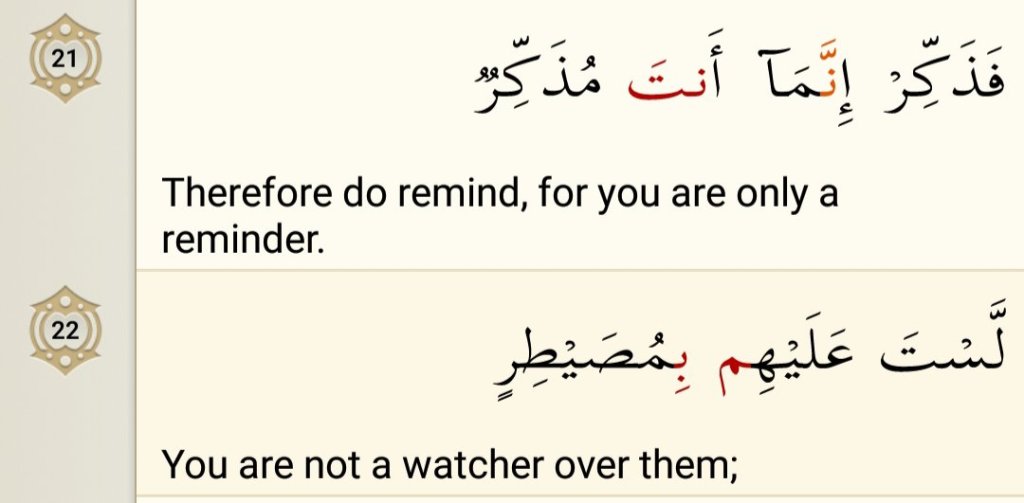
The Prophet’s pbuh mission is to make people acquainted with the real goal of life and lead them to the path of development and nearness to Allah. Of course, the path of development is paved when they do it willingly and without any outer forces, otherwise it is meaningless. The Prophet pbuh cannot force them to obey Allah and even if he could, it would be useless. Whether anyone listens or not, the instruction is just to remind without any worry as to whether it has an effect on them or not. As, Abu Sufyan became Muslim only after being warned for many years.
Allah says that the Messenger pbuh is nothing but the deliverer of a reminder which summarises the whole career of the Messenger pbuh. The work of dawah is focused at reminding people. Reminding them of the past nations that were destroyed. Of what Allah has told them of the future and of Judgement Day. Of the covenant they have made with Allah and of their inner conscience that tells them what is wrong and what is right and of the consequences of their actions.
Allah advises the Messenger pbuh that he has not been placed over the people as a musayttir. A musayttir is someone who is placed in charge of someone so that he may monitor, control and record everything that he does. Thus, the Messenger pbuh is being advised that he cannot force people or drag them into Jannah. The reminder in itself is enough and they have to find the way themselves.
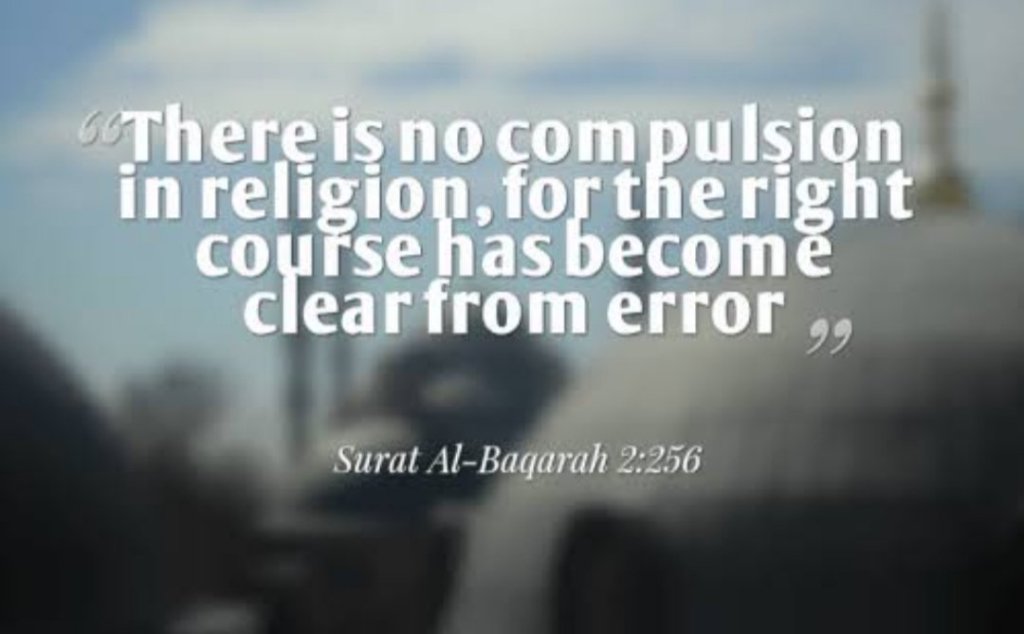
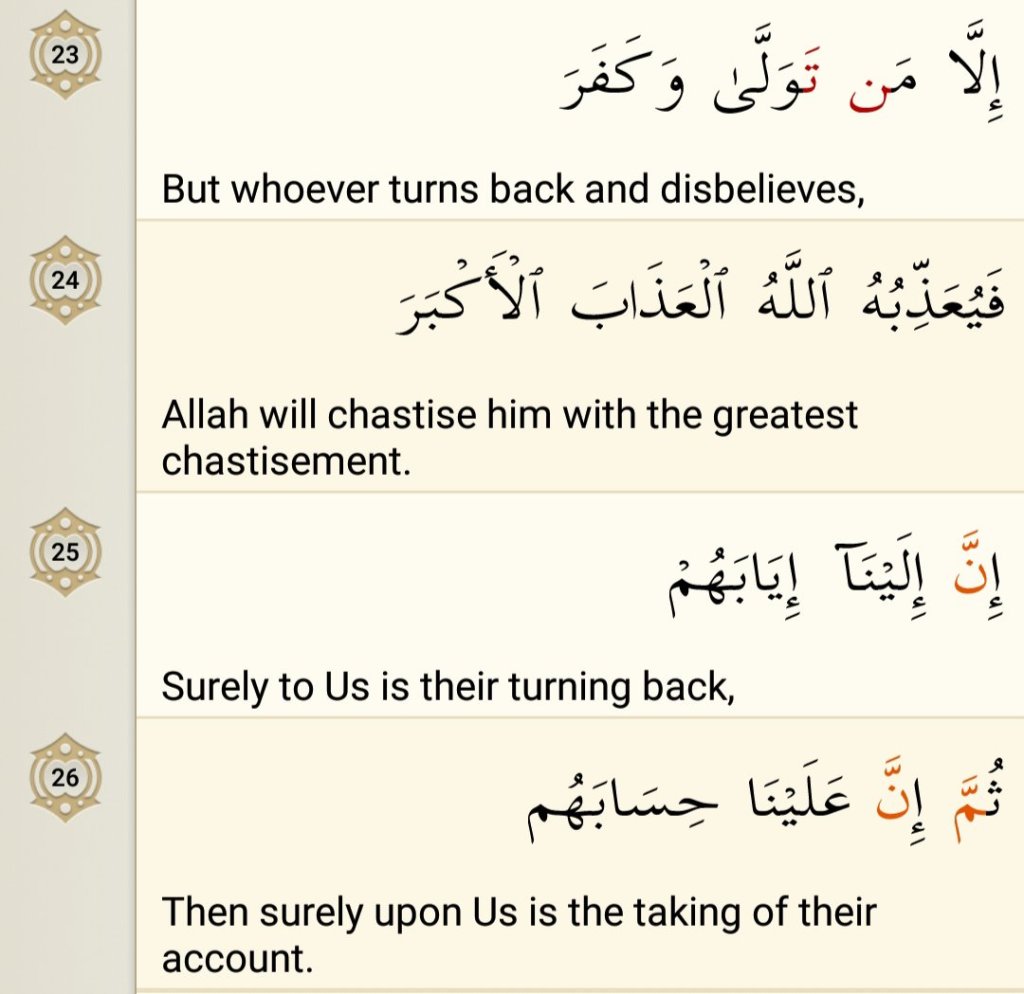
Now Allah says those who turn back and reject Allah and His Messenger pbuh who brought clear signs and message, Allah has authority over them, even though the Messenger cannot compel them to guidance but Allah will ultimately seize them and punish them with a mighty punishment’. And the Mighty Punishment is the punishment in the Hereafter as compared to the punishment in the present life as it is also said,
“So God gave them a taste of humiliation in the present life, but greater is the punishment of the Hereafter.”
(Surah Zumar V:26)
At the end of the Surah, it says with a threatening tone that
“Surely to Us will be their Return; Then surely upon Us will be the taking of their account.”
This is, in fact, a kind of consolation for the Prophet pbuh in order for him not to be upset about their obstinacy and to keep his responsibility in view. It is also a threat for all those who are obstinate in understanding who it is that will reckon with them.
Thus, Surah Ghashiyah which began by speaking about the Hereafter, ends by speaking about the Hereafter also, but in between, ‘monotheism’ and ‘prophecy’, are discussed which is the basis of Resurrection.
Therefore, it clearly states that the Prophet pbuh is sent to teach and direct people on the way and he is not responsible for people’s rejections and corruptions. All prophets of Allah have been commissioned in like manner.
